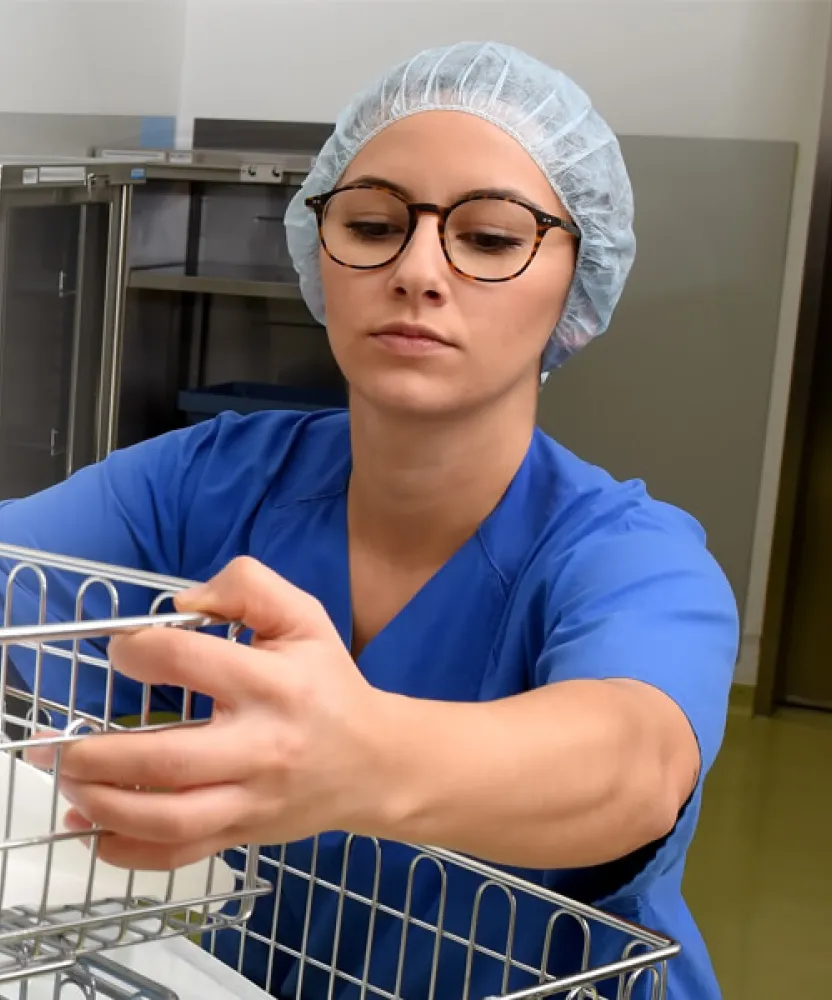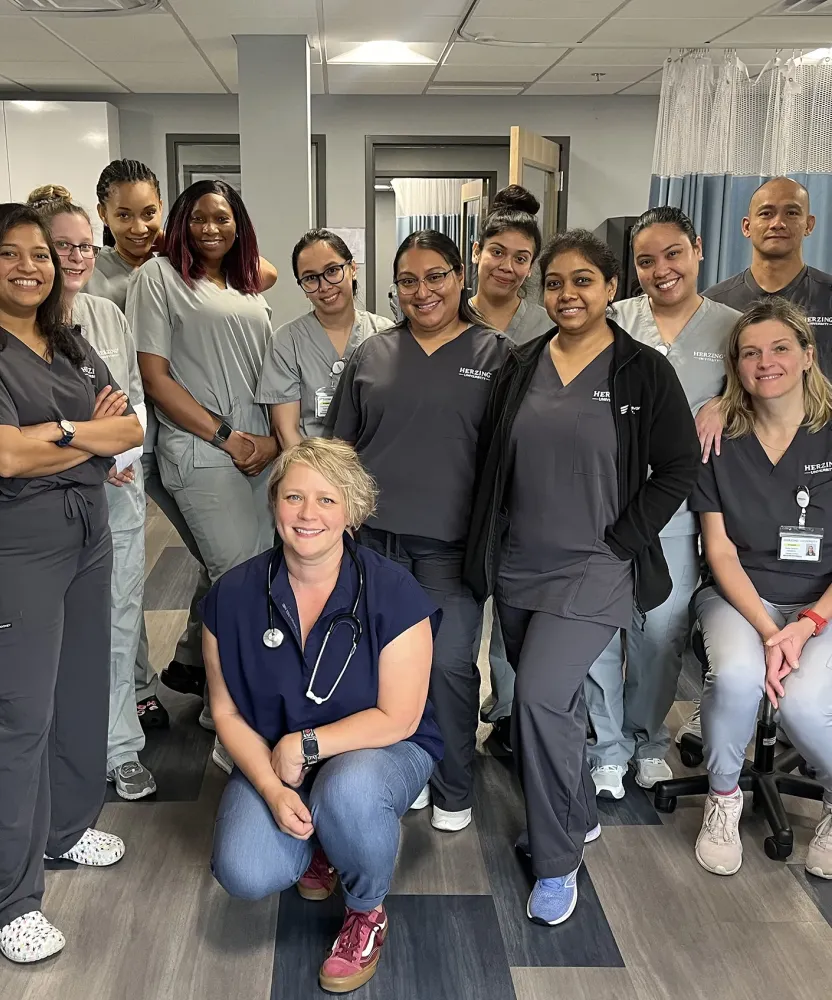Choose your path to become a medical assistant in Georgia
| Eligibility | Enrollment available for prospective students who reside in the state of Georgia |
|---|---|
| Format | Online didactic classes + hands-on clinical labs & externship; Herzing has partnerships with select clinical & externship sites in Georgia |
| Certification | Prepare for the Certified Clinical Medical Assistant (CCMA) from the NHA or Registered Medical Assistant (RMA) certification exam from AMT (depending on the program you choose).1 We pay for your first attempt! |
| Pathways | Choose a 10-month diploma program, or a 16-month associate degree program |
| QuickPaths | Discover career advancement possibilities in one of Herzing’s many online bachelor’s degree options in healthcare, including health sciences, healthcare administration—or even nursing |
| Accreditation | Accredited by the Higher Learning Commission |
Learn More Today!

Satisfaction rate
Our overall student satisfaction rate, according to the 2024 Herzing Graduate Survey.
Georgia students: You can earn an education in medical assisting online
You can take the first step towards a rewarding career in healthcare with Herzing University. Our online diploma and degree programs, available for students in Georgia, provide you the best of both online and in-person schooling to prepare you to excel as a medical assistant.
Our roots in online learning
Herzing University has been providing online learning to students throughout the United States since 2003. Every year we work to improve our processes to create strong, supportive online communities of MA students and faculty eager to help each other succeed in their education and work.
You can become a part of our vibrant online community—we’re thrilled to open our online medical assisting programs to Georgia residents.
Career-focused curriculum
Discover the crucial knowledge and skills required to succeed in your work and build a foundation for continued career growth.
Flexible schedule
You can take classes during the day or in the evening. We work hard to help you maintain school-life balance, striving to be as flexible as possible for busy non-traditional students.
Virtual services
Access to extensive virtual services, including academic advising, tutoring, support services, technical support and library services.
Lifelong support
We support your ongoing career advancement by providing comprehensive, personalized student services with lifelong career coaching.
Rolling admissions
No application deadlines to worry about. Apply when you’re ready and prepare to get started soon.
Discover new career pathways as an MA in Georgia



Earning a diploma or degree in medical assisting allows you to develop the foundational knowledge and skills needed to succeed in your first job—and build a strong starting point to continue advancing your healthcare career.
You can potentially transfer credits earned over the course of your program of choice into an associate or bachelor’s degree program in the future, reducing both time and cost to earn additional education.
Our goal as a university is to prepare you for success in your work and achieve greater career success. We exist to ensure your time and energy spent earning valuable new skills are worth the investment.
Medical assistant career info
Average salary
According to the Bureau of Labor Statistics, medical assistants in the state of Georgia earn an average annual salary of $39,640 per year ($19.06 per hour).*
Employment outlook
Projections Central projects employment of medical assistants in the state of Georgia to increase 22.5% from 2022-2032.**
Courses & Curriculum Details
Our programs feature 100% online didactic (lecture-style) courses with hands-on training in the form of clinical labs and externship experiences. Most courses in each program take 8 weeks to complete.
We design our curriculum to balance the goals of accelerating your pathway to your first MA job vs. thoroughly embedding the knowledge and skills you need to succeed.
| Program | Months i | Credit |
|---|---|---|
| Diploma in Medical Assisting | 10 | 24 |
| Associate of Science in Medical Assisting Services | 16 | 60 |
Average number of months for students to complete the program attending full-time
Diploma in Medical Assisting curriculum
Required Core Courses
All courses, 12.00 semester credit hours, are required.
Required Clinical Courses
All courses, 12.00 semester credit hours, are required.
* Enrollment and successful completion in a student readiness training course is required prior to MS 263 and two terms prior to MS 267.
Associate of Science in Medical Assisting Services
Required Courses
All courses, 24.00 semester credit hours, are required.
Required Clinical Courses
All courses, 13.00 semester credit hours, are required.
* Enrollment and successful completion in a student readiness training course is required two terms prior to MS 263 and MS 268.
Healthcare Elective Courses
A minimum of 2.00 semester credit hours is required from a combination of healthcare electives and/or credits transferred from the core (non-general education) courses of a healthcare-related associate or diploma programs. Students not transferring in 2.00 semester credit hours in healthcare courses may make up the difference with elective courses in healthcare and/or related subject areas.
General Education Requirements - Associate
Students enrolled in this program must complete a minimum of 24.00 semester credit hours in general education distributed among the following disciplines. 9.00 Semester Credit Hours in Communications EN 104 – English Composition I EN 111- Information Literacy EN 116 – Speech 6.00 Semester Credit Hours in Humanities HU 140 – Cultural Diversity HU 240 – Introduction to Humanities 3.00 Semester Credit Hours in Mathematics MA 109 – College Algebra 3.00 Semester Credit Hours in Science SC 144 – Introduction to Anatomy and Physiology* 3.00 Semester Credit Hours in Social and Behavioral Sciences PS 101 – Psychology *This requirement is being met by the programmatic science course requirement, SC 144, above.
How the hands-on component works
There are two requirements to complete either the diploma or associate degree in medical assisting programs outside of regular classes:
Clinical Labs
Two terms prior to the externship, you will be required to take two clinical courses. Most coursework will be completed online, but you will also be required to meet with a proctor at a healthcare facility (possibly a Herzing campus) to demonstrate mastery in medical assisting skills. Prior to your labs you will need to take and pass a Student Readiness Training (SRT) proctorship. You must complete a Basic Life Support (BLS) CPR class from the American Heart Association or the American Red Cross as part of the requirement.
Externship
You will complete 180 hours at a medical clinic or doctor’s office in an eight-week period during your final term—Monday-Friday during daytime hours. Depending on the requirements of your externship site, expect about 25-40 hours per week. Herzing’s clinical coordinator can assist you in your search in Georgia, but it will be your responsibility to locate and secure a proctor and externship site in Georgia during your Student Readiness Training Seminar (SRT).
Finding a proctor for your clinicals. Herzing’s Proctor Prep SRT seminar provides guidance on how to search and secure a proctor to assist in your clinical courses. This course is usually scheduled two terms before the first clinical course. In order to succeed, you’ll need to be in frequent communication with the SRT instructor. You will have access to a clinical coordinator who will assist in your search, but ultimately it is your responsibility to secure proctorship.
Contact us and we can provide answers to any further questions you have about the clinical/externship component of the medical assisting program.
Admissions Requirements
- Completion of a high school diploma, GED or equivalent
- Applicants must demonstrate the capacity to succeed in college-level courses via prior ACT/SAT scores, completion of prior college credit, or additional entrance testing; contact admissions for more details
- Given these programs involve direct patient contact in clinical or internship settings, requirements include drug testing, immunizations and health checks, and a background check
- Meet and interview with a Herzing University admissions advisor and complete an enrollment application
Waived Enrollment Fee
Discover the educational pathway designed to maximize your career potential. Reach for greater heights with Herzing University.
Faq
Frequently Asked Questions
Didn't find the answer to your question? Send us an inquiry and we will be happy to answer all your questions!
How long it takes to become a medical assistant depends on what level of education you pursue. Partner with Herzing University and you can expect a range of 10 months–20 months to get your education, get certified and start looking for a medical assistant position, depending on whether you choose a diploma or degree program.
The following timelines are based on full-time status:
- Associate degree: 20 months
- Diploma: 10 months
After earning your degree or diploma, we recommend becoming certified as a Certified Clinical Medical Assistant (CCMA) even if it isn’t required in your state. With a diploma/degree and a certification, you’ll be positioned well for your first job.
Beginning your career as a medical assistant is a great way to build a strong foundational education in healthcare, gain meaningful real-world experience and prepare yourself to continue growing professionally.
What is the next level after medical assistant? It depends on your strengths, preferences and overall career goals in healthcare.
Many fields in healthcare are potential landing spots for medical assistants looking to specialize or branch into a new career path, including healthcare management, health information management, nursing (you may consider going from medical assistant to RN), and more.
Herzing University offers many degree and diploma programs for practicing medical assistants to take a leap and embark on a new career path. Our health sciences degree program is designed to help you complete your bachelor's degree and advance your career to the next level.
Your choice depends on the career path you’d like to pursue.
If your number one priority is finding a job as a medical assistant as quickly as possible, a diploma program may be a better choice. You can earn a diploma in a year or less when attending full-time and be ready to enter the workforce as a certified medical assistant.
If you envision medical assisting as step one on a long career path in healthcare, you may prefer to choose the associate degree program. In addition to core medical assisting courses, you will take general education classes you can transfer into a bachelor’s degree program in the future. Baccalaureate options for medical assistants include healthcare administration, health sciences and health information management. Earning an associate degree will likely only take a few months longer and position you very well for the next step in your education.
A career in medical assisting involves a diverse array of roles and responsibilities. Depending on the practice you work for and department you are in, your normal everyday tasks can vary widely.
Potential tasks include (but not limited to):
- Answering the phone and greeting patients
- Informing physicians about patient concerns
- Scheduling appointments
- Gather patient information: contact info, insurance info, etc.
- Measuring patient vital signs
- Taking blood pressure, pulse and respirations
- Setting up exam rooms for procedures
- Visual and hearing tests
- Drawing blood
- Pregnancy tests
- Making patients comfortable during an appointment
No matter what’s required in your day-to-day experience on the job, what ties everything together is your professionalism, care for patients and attention to detail. Your resourcefulness will make you a valuable resource in a fast-paced healthcare environment.
Read more about a typical day in the life of a medical assistant and what you can expect after getting a job in the field.
Medical assistants typically have a greater role in patient care, and may perform tasks like taking vital signs, providing injections or medications or aiding in patient exams.
Medical office/administrative assistants practice in a clerical role rather than in direct patient care, responsible for organizing patient records, scheduling appointments, answering phones or filing paperwork.
The online medical assisting program (both diploma & degree) feature three main components:
- Online classes. Much of the coursework can be completed in the online component of the program.
- Clinical labs. You will be required to complete two clinical courses and meet with a proctor outside of class to ensure you are mastering key medical assisting skills.
- Externship. Over an eight-week period during your final term you will be required to complete 180 hours of hands-on experience in a medical clinic or healthcare facility. We can guide you in your search, but it is your responsibility to find and secure an externship site.
Our goal is to fully prepare you to thrive in your new career. The clinical and externship hands-on component of the program is crucial to helping you get the experience you need to become a medical assistant right out of school.
Students in the online program will take the RMA exam during their review course – which is a requirement to pass. Herzing will pay for the exam once.
Certification is not always required, but job duties may be limited in certain states if you don’t get certified.
Even if you aren’t legally required to be certified, many employers will require certification and it will make you available for more job opportunities, better pay and greater chance for advancement.
Sitting for and passing either the Registered Medical Assistant (RMA) exam or Certified Clinical Medical Assistant (CCMA) exam may open many more doors to start your career as a medical assistant.
According to the Bureau of Labor Statistics, these are the most common places of employment for medical assistants:
- Physician’s offices
- Hospitals
- Offices of other health practitioners
- Outpatient care centers
- Retirement communities / assisted living
While practical nurses (LPN) and medical assistants often perform similar tasks, there are a few key differences to be aware of, including:
- Educational requirements
- Average salary
- Scope of practice
- Ongoing career opportunities
- Future outlook for jobs
Learn more about the difference between practical nursing and medical assisting and how to go from MA to LPN.
Because medical assistants can wear so many different hats there are many important skills needed to thrive in different healthcare environments:
- Professionalism. In many positions you will need to handle customer service tasks, basic patient care and clearly communicate physician information to patients. Medical assistants must demonstrate professionalism and tact when interacting with patients.
- Attention to detail. Medical assistants may gather patient contact or insurance information and keep medical records organized. You must be meticulous and highly detail oriented to succeed.
- Compassion. Making patients comfortable and empathizing with their concerns is crucial ensuring patients are calm and collected for medical procedures.
- Multi-tasking. Staying organized and measured in the face of quickly changing circumstances and a lengthy “to-do” list will make you indispensable to a healthcare team.
These are just a few key medical assistant skills that will help you excel in medical assisting and beyond to many other career opportunities in healthcare.
The Student Experience at Herzing
It was simultaneously the hardest and most rewarding experience of my life.
Shambretta Johnson
Healthcare Student | Madison CampusWhen I enrolled in Herzing University’s medical assisting program, I was already working in a doctor’s office. While I liked my job, I wanted to learn all I could and discover what more I could do with my career.
Carolyn E. Farquharson
Healthcare Student | Online CampusIf you want to go back to school, do it and don’t let anyone stop you!
Lakeisha Walton
Healthcare Student | Brookfield/Milwaukee CampusNow that I’m a graduate, I’ll be getting to work at the same place I did my externship!
Kendra Penn
Healthcare Student | Online CampusYou never know what you can achieve until you try!
Richelle Coney
Healthcare Student | Brookfield/Milwaukee CampusDisclosures
1. Certification in this program is not a state requirement.
* BLS pay estimates calculate the median annual wage for various occupations. Per the BLS the median wage for an occupation is: "The wage at which half of the workers in the occupation earned more than that amount, and half earned less. Median wage data are from the BLS Occupational Employment and Wage Statistics survey." Bureau of Labor Statistics (BLS), U.S. Department of Labor, Occupational Outlook Handbook 2024. BLS median wage estimates do not represent entry-level wages and/or salaries. Multiple factors, including prior experience, age, geographic market in which you want to work, and degree level and field, will affect career outcomes, including starting salary and earnings as an experienced employee. Herzing neither represents that its graduates will earn the median salaries calculated by BLS for a particular job nor guarantees that graduation from its program will result in a job, promotion, particular wage or salary, or other career growth.
** Projections Central, Long-Term Projections (2022-2032). Multiple factors, including prior experience, age, geography market in which you want to work, and degree field will affect career outcomes. Herzing does not guarantee that graduation from its program will result in a job, promotion, or other career growth.
Waived Enrollment Fee
Discover the educational pathway designed to maximize your career potential. Reach for greater heights with Herzing University.



